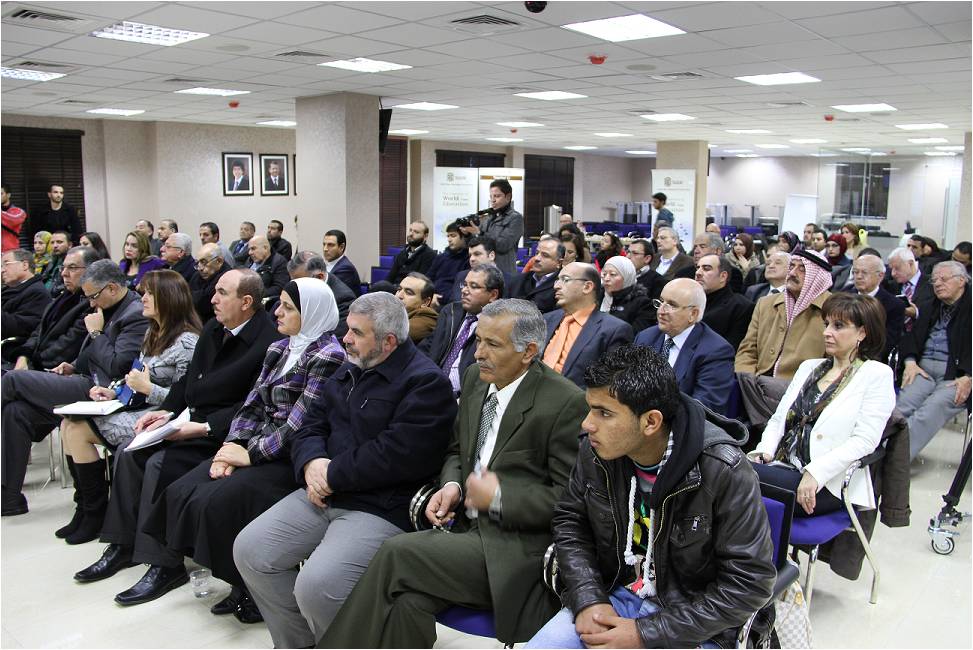EPDF Organizes 'Fighting Corruption in the Private Sector' Seminar at TAG-Forum
26 Jan 2013AMMAN-----January 23, 2013---- The Economic Policy Development Forum (EPDF) organized a seminar with His Excellency Dr. Mohi Eddin Touq, head of the Integrity and Transparency Team at the EPDF on “Fighting Corruption in the Private Sector” at Talal Abu-Ghazaleh Knowledge Forum.
The seminar was attended by a host of dignitaries headed by HE Dr. Talal Abu-Ghazaleh, EPDF chairman, HE Mr. Abdul Ilah Al Kurdi, president of the Ombudsman Bureau in addition to their Excellencies Mr. Ali Al Dmour, Ms. Sanaa Mehyar and Mr. Ramzi Nuzha from the Jordan Anti-Corruption Commission in addition to economists, businessmen and media representatives..jpg)
In his presentation, Dr. Touq gave information on the international indicators for governance and anti-corruption, in addition to types of corruption in the private sector citing examples globally with a special focus on the definition of corruption which is “wrongdoing on the part of an authority or powerful party through means that are illegitimate, immoral, or incompatible with ethical standards”, pointing out that there is a need to differentiate between corruption as defined by the law and between the administrative errors conducted by officials.
"During the last ten years, Jordan's status in all indicators regarding governance and control of corruption remained the same and there has been no real breakthrough in terms of digital signs or ranking among countries which deserves to have a study to underline the causes behind it," he said.
Touq stressed on the need to fight corruption in the private sector because it is one of the pillars of the National Integrity System and good governance, especially as corruption in the private sector hinders economic development and harms fair competition, and it has a cost too expensive for the private sector and the state alike, he also pointed out that corruption hinders reform efforts.
He also stressed on the fact that corruption can lead to a real problem for companies and impose fines which can lead to bankruptcy and imprisonment citing example of US ENRON and German Siemens company in the US that were fined $ 2 billion because of bribes they paid, and HSBC which paid US1.92 billion to close the money laundering case stating that corruption can be a problem to countries and harm the economy.
Touq pointed out that corruption would be also one of the main reasons for the flee of capitals and investments and the drop in external financial aid which consequently damages the sustainable development projects.
He said that corruption is a phenomenon that is not isolated or exclusive to one sector or organization saying that it’s difficult to find a committed private sector with a corrupted government and vice versa. “The solution to fight this phenomenon is to have a comprehensive strategy in which all concerned parties in particular the government, private sector and civil society take part in.”
Touq pointed out some of the sectors that are exposed to corruption such as: oil, public works, gas, mining, power generation and distribution.
He summarized some of the measurement that can be taken by a government to fight corruption such as imposing fines for crimes of bribery and embezzlement in the private sector and to revoke companies that don’t comply with the acceptable standards, fighting money in politics, enhancing standards of accounting and auditing in addition to others.
According to Touq, the private sector from its part should integrate impartiality and fighting corruption programs within the mission of the business commissions, chambers of trade and industry, and to abide by the principles of the United Nations Global Compact, and to acknowledge the UN Convention against Corruption and its implementation, in addition to create an appropriate clean work environment.
While concerning precautionary measures in the private sector, Touq called for the enhancement of the standards of accounting and auditing, imposing deterrent penalties in cases of incompliance, and to expose the facilities, accounts, financial statements of the private sector to the proper auditing procedures.
At the end of the seminar, the lecturers answered many questions raised by attendees.





